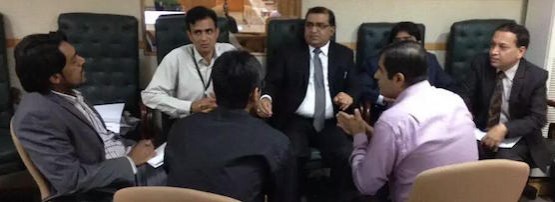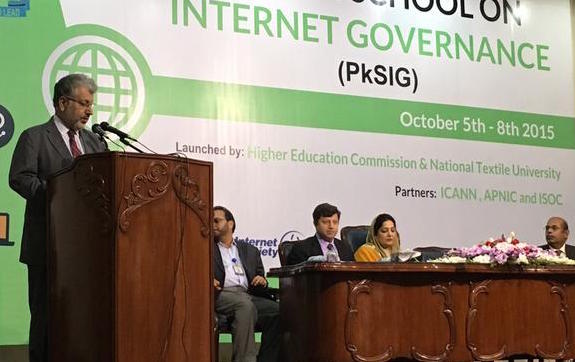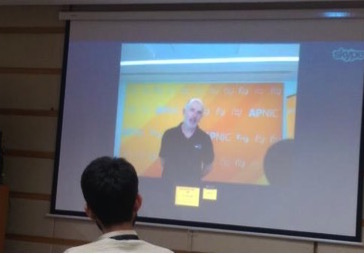
Last month, the Pakistan School on Internet Governance (pkSIG) launched with an inaugural four-day workshop. One of the attendees, Adeel Sadiq, provides his insights into the creation of the school.
Why was pkSIG established?
Pakistan has been moving rapidly in the field of information technology for the past few years. The cybercrime bill (Prevention of Electronic Crimes Act 2015) was the prime reason behind pkSIG. The YouTube blockage also stirred the community to stand up for themselves.
After the success of Cyber Secure Pakistan 2015 and introduction of global Internet bodies like APNIC and ICANN at the event, people came to realize the Internet is much more than social media. Hence, a comprehensive School on Internet Governance was organized from 5 to 8 October in Islamabad to improve the current Internet situation in Pakistan.
Who has helped organized it?
Dr. Arshad Ali, Rector National Textile University Faisalabad, is behind the School. Dr. Mukhtar Ahmed, Chairman Higher Education Commission of Pakistan, joined with Dr. Arshad Ali to host this event and provided much-needed support.
Seeing the importance of the School for the future of Pakistan, Pakistan Telecommunication Authority and Government of Pakistan also stepped in. The event would not have been possible without ICANN, ISOC and APNIC support as well.
Why is pkSIG important for Pakistan?
Pakistan has considerable Internet traffic, but no proper laws to regulate the content. Internet access and content blockage have been an issue since the ban of YouTube. People lack basic knowledge of governance bodies and the role they can play to create a secure environment. In case of particular cybercrimes, we do not know what to do and who to approach. To discuss the implications of the cybercrime bill, people need to be made well aware of the structure of how the Internet works and the related global bodies.
What challenges will pkSIG look to overcome?
The School will discuss most of the Internet problems such as uniform access, infrastructure development and deployment, legislation and its implementation, a central regulation body, online child protection, harassment, net neutrality, content availability, e-services, e-governance, digital economy and of course the cybercrime bill.
What will be taught at pkSIG?
The School will cover the backbone working groups of the Internet like ICANN, ISOC, the RIRs, IANA, IETF, their significance, and how each group contributes to the working of the Internet.
Once the basic foundation is laid, the School will move to the governance of the Internet, including the role of all the stakeholders. Most of the challenges the Internet in Pakistan faces will also be addressed.
What do you hope to learn from pkSIG?
Being an engineer and a fellow to the APNIC 40 meeting, I already have a basic idea of the technical side of the Internet. But now is the time to dig deeper for a comprehensive understanding, especially regarding regulation. There are a lot of misconceptions to be addressed, such as that ‘the USA controls ICANN’. It will be be a very good place to discuss and verify the claims of the people from academia, civil society, private sector and the government. The challenges faced by Pakistan’s Internet is a topic everyone should be really looking forward to.
How will attending help you in the future?
To most people, the Internet is just Facebook. And that’s the problem. Unless you have background knowledge of something as phenomenal as the Internet, you cannot figure out the root cause of the problems.
It will not only broaden my horizon and clear the misconceptions, it will provide me with enough knowledge to spread what I will learn and teach everyone who is part of the Internet ecosystem. Most of the problems we face today are due to the lack of the awareness and expertise. The most important part of the School will be to integrate the knowledge with others.
For me, the real work in the field of Internet governance will begin after the School ends. I will not stop until I have taught at least my friends about the importance and need of Internet governance for the present world.
Why are you interested in Internet governance?
You need to understand the logic behind something to solve the problems related to it. Pakistan has always been lacking when it comes to the Internet. The YouTube block, censorship and now the cybercrime bill has fueled my thirst of knowledge to better comprehend the overall situation going on not only in my country but also throughout the world.
Adeel Saqid is a recent graduate from National University of Sciences and Technology Pakistan as an Electrical Engineer. He is currently working as a Network Engineer for Huawei Technologies Pakistan.
The views expressed by the authors of this blog are their own and do not necessarily reflect the views of APNIC. Please note a Code of Conduct applies to this blog.



Dear Concern,
This is with reference to Pakistan School on Internet Governance (pkSIG) launching which is very good initiative ,
Congratulation
Regards,
Syeda Kanwal Ali
Gerrys Information Technology